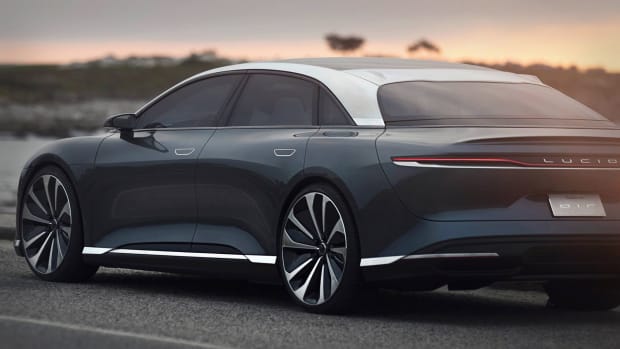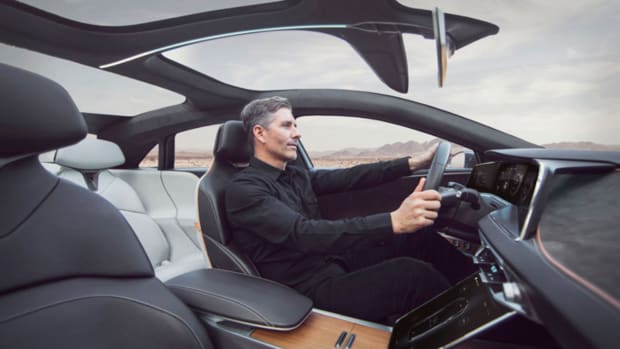Lucid Group (LCID) is smiling.
That's noteworthy given the state of the automotive sector, which finds itself caught between the supply-chain disruption caused by the covid-19 pandemic, the shortage of computer chips required to run cars, and Russia's invasion of Ukraine, which is fueling a runup in prices of critical raw materials such as nickel.
Nickel is a key component of batteries, the centerpiece of electric vehicles, and Russia is one of the main producers of the metal.
This challenging landscape has prompted some vehicle manufacturers to raise prices. But above all it has created a sharp supply-demand imbalance. Consumers' interest in buying EVs is growing just as automotive groups -- lacking critical car parts -- are struggling to produce enough vehicles to meet that demand. Carmakers' lists of reservations and orders are very long.
Besides these industrywide problems, Lucid Group, which started producing cars in September 2021, is also having difficulty increasing production rates.
This is a problem that new car manufacturers usually encounter -- but overcoming it is also key to the financial futures of these younger companies. For example, Tesla, (TSLA), the EV industry leader, was on the verge of bankruptcy from 2017 to 2019 as it tried to mass-produce the entry-level Model 3 sedan for the broad consumer market.

Lucid Motors
Huge Order from Saudi Arabia
Lucid has just received an order that gives it some substantial breathing room: The government of Saudi Arabia has just ordered 100,000 Lucid vehicles over 10 years. The initial purchase commitment is 50,000 vehicles; the government also has an option to buy another 50,000 over the same period.
"Delivering up to 100,000 Lucid electric vehicles in Saudi Arabia represents another pivotal moment in our acceleration of sustainable transportation worldwide," said Peter Rawlinson, Lucid's chief executive and chief technology officer, in a statement.
"We are delighted to be supporting Saudi Arabia in achieving its sustainability goals and net zero ambitions, as outlined by Saudi Vision 2030 and the Saudi Green Initiative, by bringing our advanced luxury EVs to Saudi Arabia."
It is important to note that Saudi Arabia is the controlling shareholder of Lucid Group. Public Investment Fund, the country's sovereign wealth fund, owns more than 62% of Lucid.
Moreover, Lucid will soon start building its second production plant in Saudi Arabia. The company expects to manufacture up to 150,000 vehicles a year at this facility to serve international markets.
The plant will follow the company's current production site in Arizona.
Saudi Arabia's vehicle purchases include vehicles built and assembled in both Arizona and the kingdom, Lucid said.
The order quantity is expected to range from 1,000 to 2,000 vehicles annually and increase to between 4,000 and 7,000 vehicles annually starting in 2025, according to the company.

Lucid Motors
Will Lucid Deliver?
The first deliveries will begin in the second quarter of 2023.
Lucid isn't specifying the total value of the deal. It says only that the models involved are the Lucid Air sedan and "future models." The base price for the standard Lucid Air -- Lucid Air Pure -- is $77,400. There are configurations priced at $95,000, $139,000 and $179,000 as well.
The Lucid Air was crowned luxury electric vehicle of 2022 by Cars.com
"The purchase price of the vehicles will be determined based on the lower of the standard retail price for the applicable vehicle in Saudi Arabia and the standard retail price for the applicable vehicle in the United States," Lucid explained.
"Plus the logistics and importation costs and other costs of delivering and homologating vehicles to regulations of Saudi Arabia."
The open question is whether Lucid will be able to deliver these vehicles on time.
At the end of February, Lucid lowered its production target. The company now expects to produce 12,000 to 14,000 cars in 2022, a drop of 30% to 40% from its initial forecast of 20,000 units.
The new numbers reflect supply-chain issues and bottlenecks.
"This reflects the extraordinary supply-chain and logistics challenges we've encountered and our unrelenting focus on delivering the highest-quality products," said Rawlinson.







